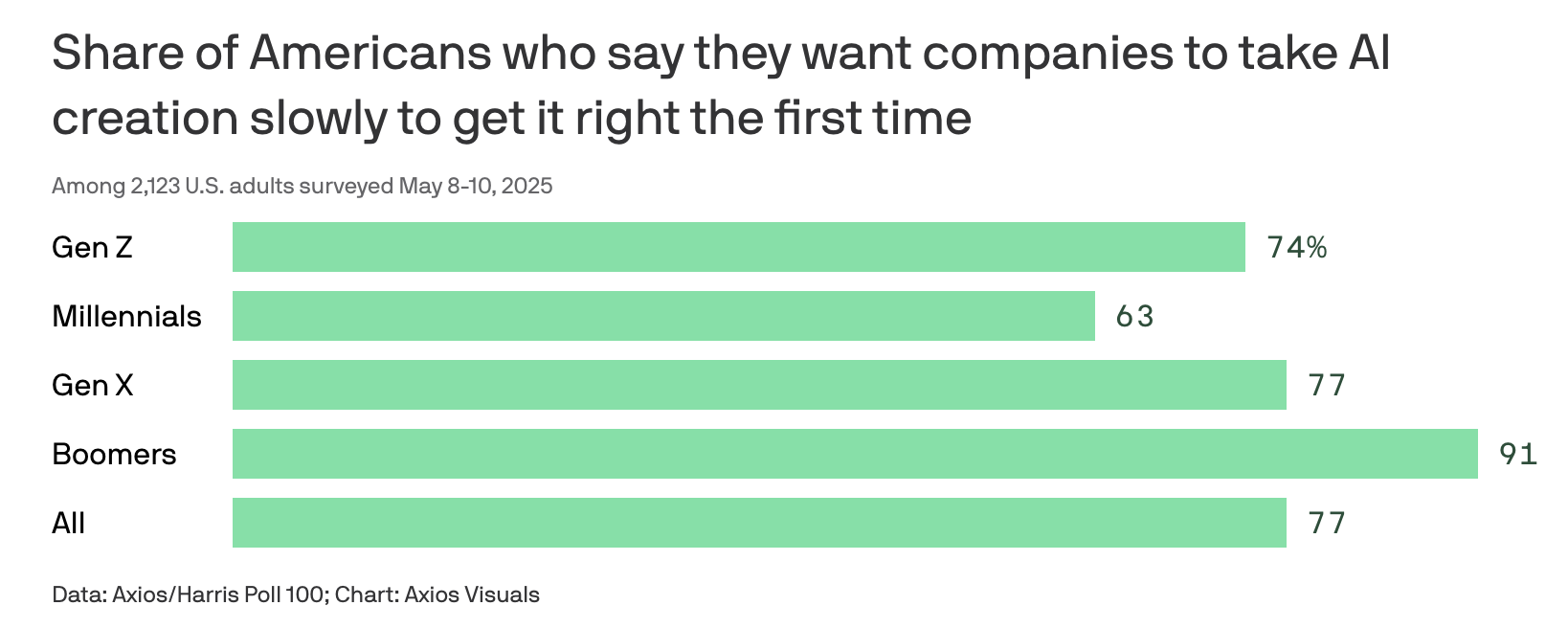The Future Remains Human
Recent survey research indicates that the generative artificial intelligence industry insiders and the American public at large have widely divergent perspectives on the likely impact of generative AI development.
Results of an Axios/Harris survey released yesterday indicate that over three quarters of Americans want the development of generative AI technology to take place at a slow, deliberative pace, in order to avoid harms to society. Generative AI industry insiders, on the other hand, are demanding massive new investments and protection from regulation, claiming that there is a “race” to develop new generative AI tools that can “dominate”. There is no other acceptable option, they argue, than for American businesses to “win” this “race” against adversaries.
A recent Pew Research survey finds that the majority of generative AI industry insiders believe that generative AI technologies will have a positive impact on how Americans work (73%) and the economy in general (69%). It is not surprising, given that people working in generative AI experience personal economic benefits development of the technology, to learn that most of them believe that developing AI is economically beneficial.
What is notable in the Pew survey is that the American people in general appear to have a dramatically more negative perception of the likely economic impact of the development of generative AI technologies. In the general American population, only 23% percent of people believe that the development of generative AI will have a positive impact on how people work, while only 21% believe that generative AI development will have an overall positive economic impact.
In spite of Americans' reluctance about the unrestrained development of generative AI, the United States Congress has included a provision in the recent "Big, Beautiful" budget bill passed by the House of Representatives that prohibits US state and local governments from regulating generative AI for the next 10 years. The Senate has yet to pass equivalent legislation.
The divergence between generative AI insiders and the broader American population sets the stage for future conflict. While the generative AI industry has been successful in lobbying the US Congress to support the move-fast-break-things-again approach to technological development, it has not been successful in convincing Americans in general of the wisdom of this aggressive path.
In an interesting convergence of these perspectives, Rutgers law professor Ellen P. Goodman notes that the no-regulation approach to generative AI may interfere wth the innovation of new technology even as it threatens society as a whole. She writes:
"The House’s proposed moratorium is of dubious legality and is not in line with past federal emerging tech policy bans on state regulation. It also might well depress the very vitality of American AI innovation and diffusion, which are its apparent goals. This is because regulation can support innovation by boosting business, individual, and government confidence in the technology."
It's difficult to make specific predictions in these chaotic times. Considering the precedent of weak regulation over the development of digital technologies as a whole seems wise, however. Goodman advises:
"Federal forbearance from regulating internet-related technology, particularly after mobile diffusion, was probably not good from competition, innovation, and social welfare perspectives."
In the present, the future is a stage of the imagination. It's a psychological space into which we project our most urgent emotions, both positive and negative. So, when we talk about the likely future impact of generative AI, we're also talking about our needs and fears in the present.
The course of digital culture has not followed the predictions of technofuturists. Social media platforms have made us less social, and more lonely, but when social media first emerged, few anticipated that isolation would result. Instead, eager technology pundits predicted that social media would bring people together and spread democracy around the world, enabling activists to connect in new ways to resist authoritarian regimes. Authoritarianism is now on the rise across the world, and social media has played a significant role in enabling the emergence of fascism.
Social media didn't strengthen society. The information superhighway didn't make us more informed. Given this pattern, many suspect that generative artificial intelligence will not generate more intelligence.
Techno-optimists are the last group of people who still believe that the arc of history inevitably bends toward justice.
The future is not destined. There is no inevitable outcome to the development of generative artificial intelligence.
We, the humans, still have the power to decide what happens next.

